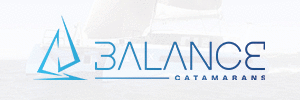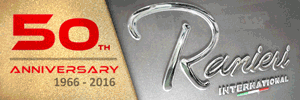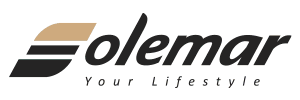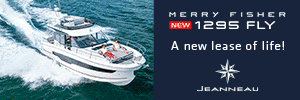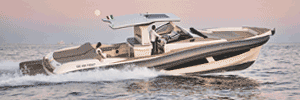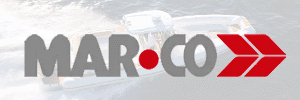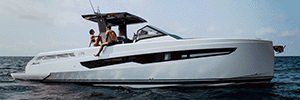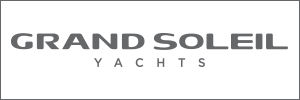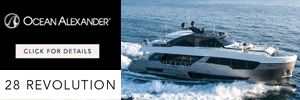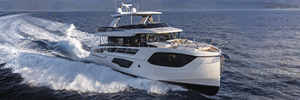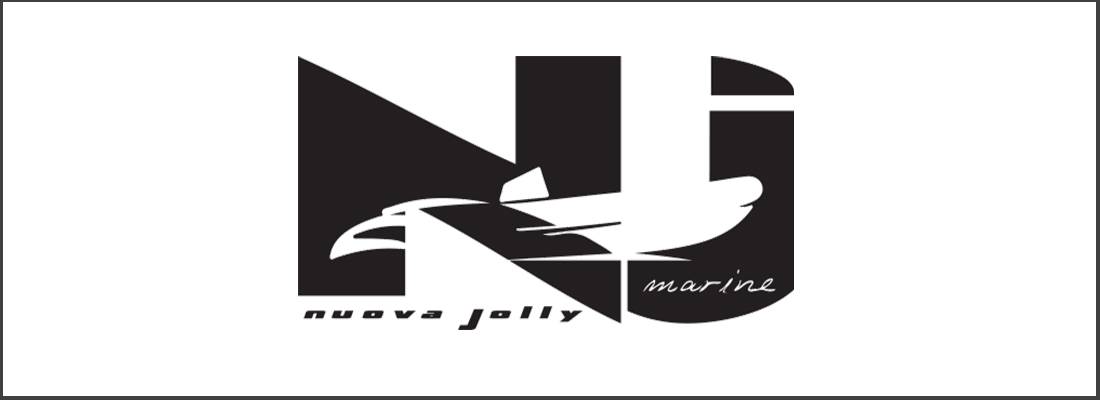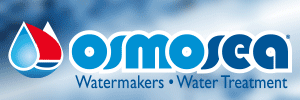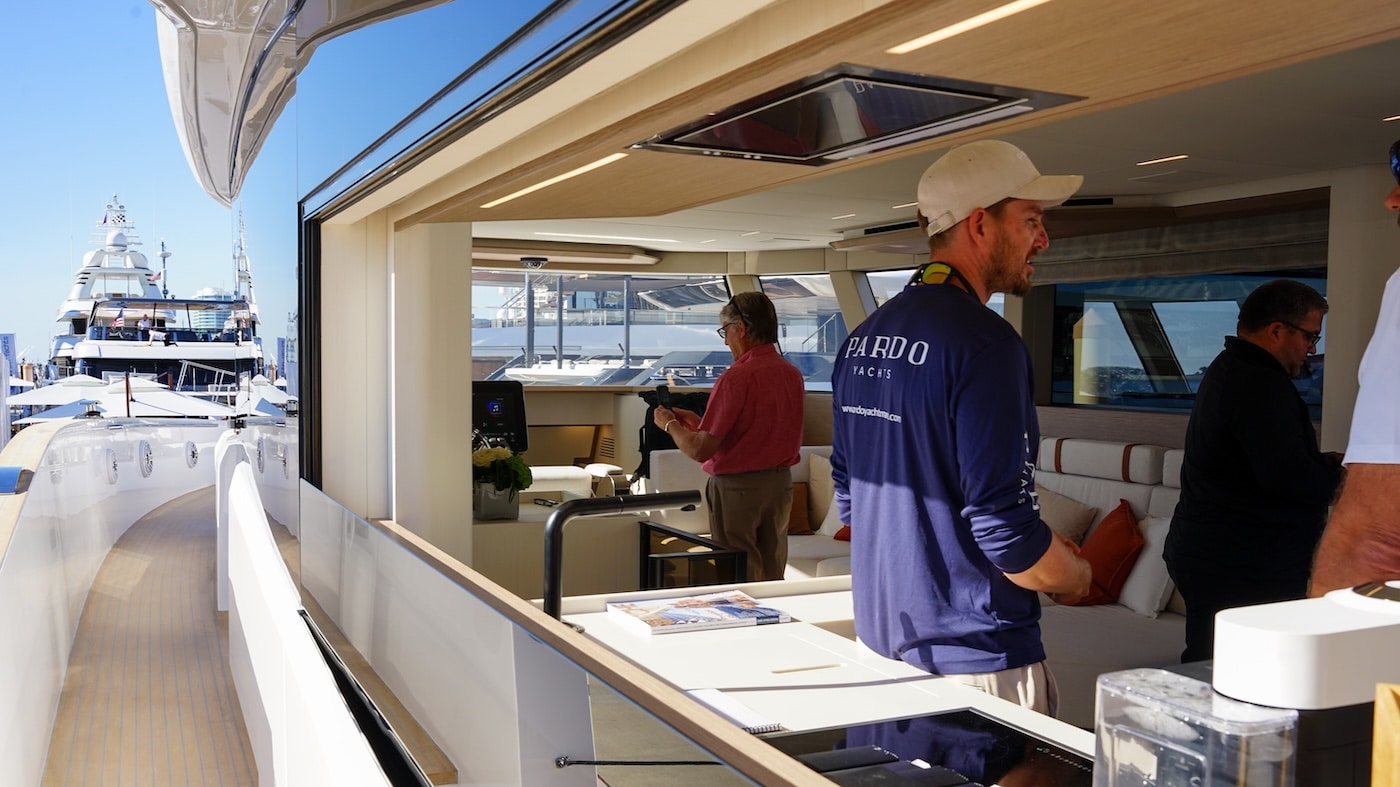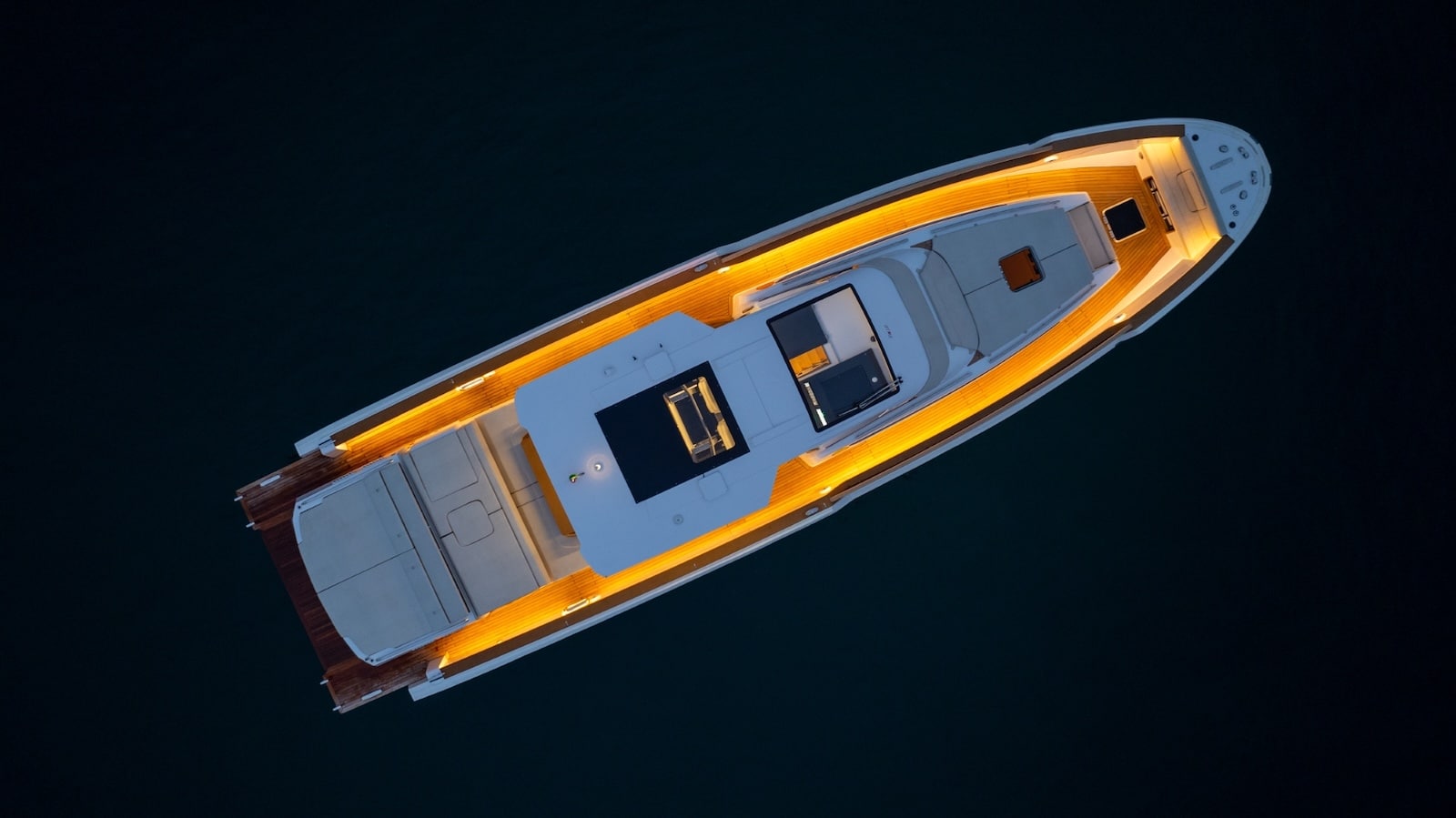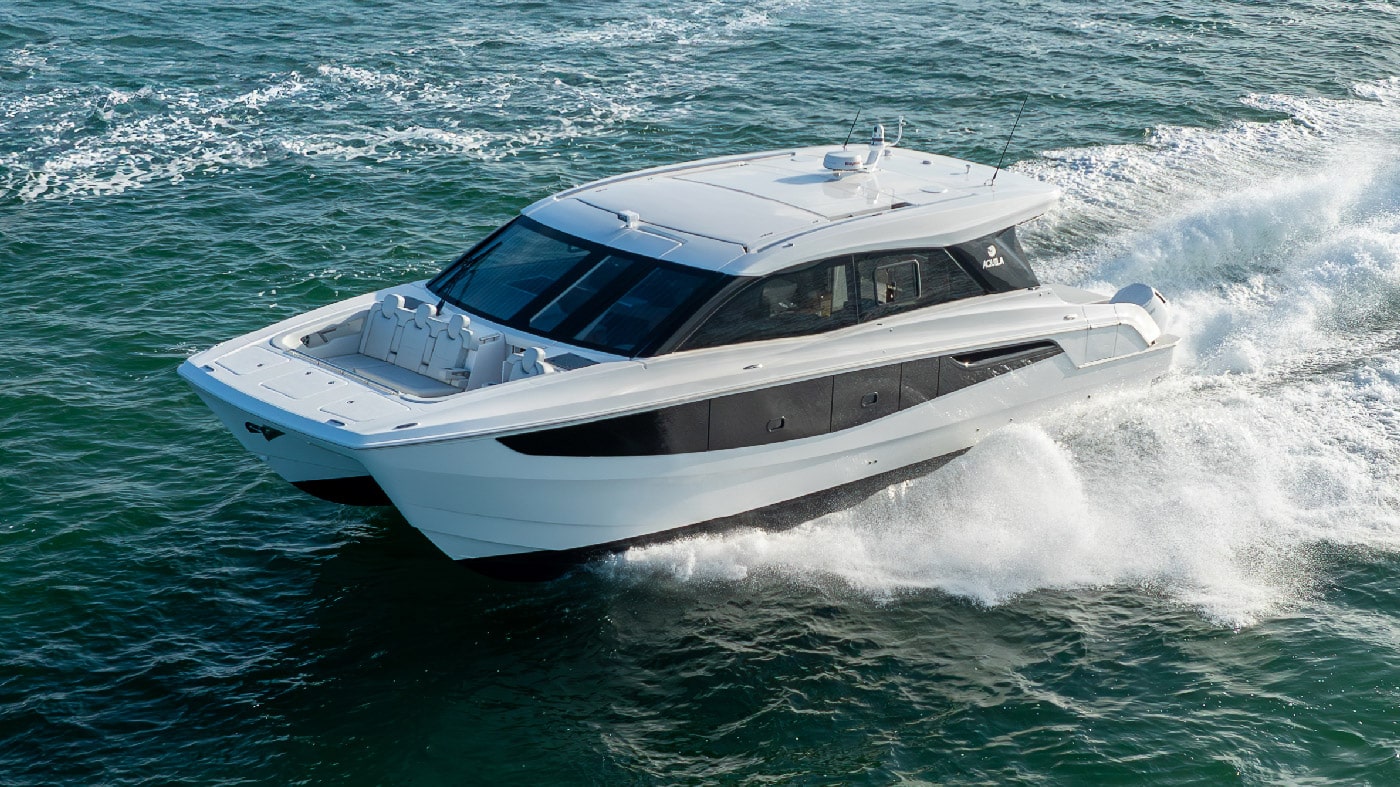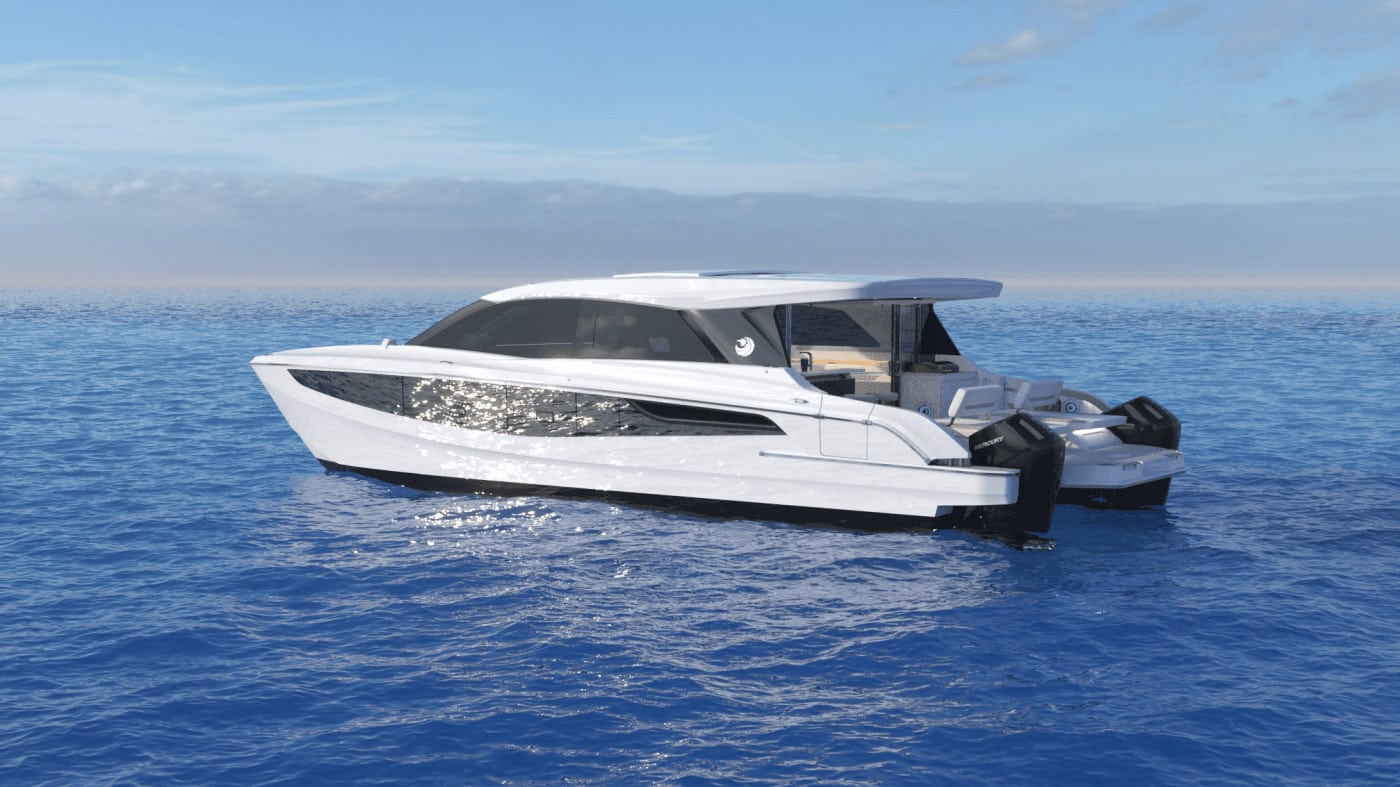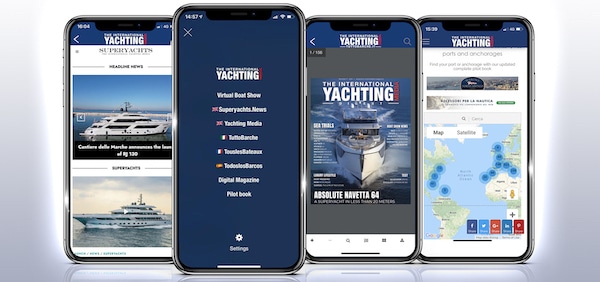Scanner Envy 1100: on test in all her versions
As all boating enthusiasts well know, outboard and sterndrive engines are two different worlds. This is precisely why it is worth comparing them, and we have done so by testing the differences between the two engines installed on the same RIB model, the Scanner Envy 1100: we had the pleasure of testing this boat on the same day, both in the version with two 350 hp Volvo V8 sterndrive engines and the version with two 300 hp Yamaha V6 outboards.
That these inflatables are both beautiful and powerful is immediately apparent when we arrive at the jetty on Lake Maggiore, where they were waiting for us for the test, and it is really hard to choose between one or the other. In fact, both exhibit the typical style of the well-kept, high-quality boatyard that makes Scanner Marine a major player in the RIB world.
Scanner 1100 Envy: differences
Before going into the 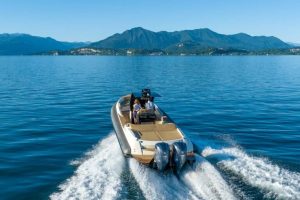
HT stands for ‘hard top’, which is the distinguishing feature of this version, which therefore offers more shelter from wind and cold than the TT (which stands for ‘t-top’). However, this is not necessarily a defect; on the contrary, it depends on the intended use of the motorboat: being without the shelter can also mean enjoying greater freshness and more air in your face as you speed through the water, especially in these hot summer months. Furthermore, the t-top version, with its elegant and clean lines, is very sporty and of great design.
The choice, in short, becomes strategic depending on the use you are going to make of it and above all the waters you are going to cruise. Both models are available with outboard or sterndrive engines.
In our test we used both outboard and inboard versions to analyze the differences on the exact same boat.
The Scanner Envy 1100 in detail
As soon as we climb aboard the two RIBs, we are pleased to discover that the spaces are really well well-proportioned: on board, the impression is not of being on an 11-metre boat at all, as the central part offers wide walkways with ample use of teak that frames the entire length of the deck, allowing easy passage from the stern platform to the bow.
Clearly, in the sterndrive version the swim platform has a much larger surface area than in the outboard model, making access to the water easy. However, even in the Envy 1100 HT the space remains generous, despite the bulkiness of the two engines. Another difference is in the ladder for descending into the water, which in the sterndrive version is installed centrally on the stern, while for the outboard version it is located on the side of the stern platform.
As far as the helm station is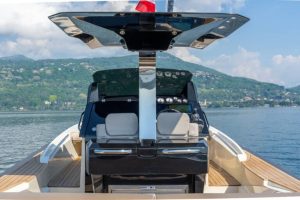
On the stern, on the other hand, two huge sundecks allow the guests to lie back and soak up the breeze or simply sit back and enjoy sunbathing.
The cushioning area in the bow is also far more than one could imagine: convertible into a dining area, it can comfortably accommodate six people here too. Lastly, going below deck, despite her 9.9 metres at the waterline, the Scanner 1100 offers a large bed for two and an area served by a small head, a washbasin and plenty of closed spaces for use as lockers or storage.
In short, even though she was born to be a day-rib, aboard a Scanner Envy 1100 you can easily plan a holiday without problems of space and comfort on board.
Scanner Envy 1100 sterndrive on test
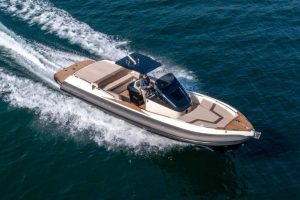
The first surprise is in the extremely satisfactory performance indicated by the on-board instrumentation: at 600 rpm we reach 3.7 knots with a consumption of just 6 litres per hour; at 1000 rpm we reach 5.5 knots with 11 litres per hour.
The day is very hot and Lake Maggiore is completely flat, so we try to give a little throttle and accelerate until the boat gets up on plane: the hull enters the so-called comfort zone where everything finds its balance.
We exceed 15 knots at 2,500 rpm and push on to a top speed of 47.6 knots at 5,800 rpm. With a consumption of around 200 l/h..
We reduce speed and return to around 3,000 rpm, our speed is around 20 knots and we start to do a bit of steering to see how this rib behaves.
The clean lines of the hull allow us to make very tight turns even at high speeds. Accelerating during the same turn we bring ourselves up to 3500 rpm and with a speed of 26 knots we realize how stable this hull is even in a tight turn.
Nothing less: the performance is powerful, and we can’t wait to compare it with outboards.
Scanner Envy 1100 Outboard on test
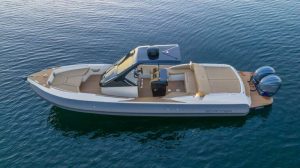
Already at 1000 rpm the speed is around 6 knots with a consumption of 11.5 l/h, similar therefore to that of the sterndrive motors, and increasing the number of revs to 2400 the speed is more than doubled to 14 knots, just lower than the previous test. The amazement rises as the revs increase, because at 3600 we are consuming 72 l/h at a speed of 28 knots, but the hull is not suffering and vibrations on board are non-existent, so much so that at the stern they are sunbathing in peace.
The noise of the outboards is not deafening at all and even when we reach the top speed of 47.3 knots, with a consumption of 197 litres per hour, the rib remains perfectly controllable and the helm responds perfectly.
We reduce speed to around 4000 rpm with a speed that still remains high – we’re at 32 knots – to try a few turns, during which we appreciate the perfect balance of this 11-metre Scanner boat passing over the wake waves, the Envy 1100 behaves like a great RIB and remains easy to steer.
Conclusions
To conclude this day of discovering the different engines of the two Scanner Envy 1100s, we can say that both solutions are winning and that, apart from the sporty set-up of the outboard engines, both boats have respectable performance, so it remains difficult to decide which of the two we like best… the choice is yours.
Sterndrive version – technical specs
RPM | Kn | L/h |
600 | 3,7 | 6 |
1000 | 5,4 | 11 |
1500 | 7,8 | 16 |
2000 | 10 | 28 |
2500 | 15,4 | 39 |
3000 | 21,1 | 51 |
3500 | 26,5 | 66 |
4000 | 31 | 82 |
4500 | 36,4 | 108 |
5000 | 41 | 146 |
5500 | 44,9 | 186 |
5800 | 47,6 | 201 |
Outboard version – technical specs
RPM | Kn | L/h |
1000 | 5,9 | 11,5 |
1500 | 7,4 | 17,5 |
2000 | 9,3 | 38,8 |
2500 | 13,9 | 40,5 |
3000 | 21,8 | 55 |
3500 | 27,6 | 72,4 |
4000 | 32,5 | 97,6 |
4500 | 35,9 | 114,3 |
5000 | 42,4 | 165,9 |
5700 | 47,3 | 197 |

